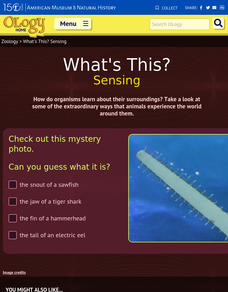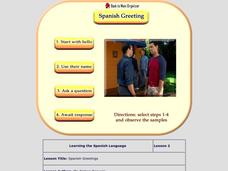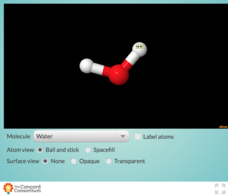Howard Hughes Medical Institute
Modeling Trophic Cascades
In the ecological game of who eats who, one small change can have a big impact! Individuals create food chains in an array of ecosystems, then determine what happens to organisms in the chain when one organism changes its feeding...
Curated OER
Exploring Microclimates
Students compare the land cover and temperatures in different microclimates to begin to explain why organisms live where they do. While exploring microclimates, students record temperature readings and detailed observations.
Curated OER
Peregrine Falcon
Young environmentalists study the effects that pesticides have on birds, such as the peregrine falcon. They also look at predator/prey interactions. Some wonderful in-class activities accompany an inventive lesson. After an activity that...
Curated OER
Lesson Four: Comparatives and Superlatives
Put on your best smile, or a least a better one, for this lesson on superlatives and comparatives. English language learners first fill out a graphic organizer by finding other people in the class who are taller than they are, shorter...
Chicago Botanic Garden
Carbon, Greenhouse Gases, and Climate
Climate models mathematically represent the interactions of the atmosphere, oceans, land, sun, surface, and ice. Part two in the series of four lessons looks at the role greenhouse gases play in keeping Earth warm and has participants...
Annenberg Foundation
Teaching Geography: Workshop 4—North Africa/Southwest Asia
Can Jerusalem be equitably organized? Can Israel and Palestine be successfully partitioned? Part one of a two-part workshop looks at the geo-political history of Jerusalem while Part two investigates Egypt's dependence of the Nile River...
American Museum of Natural History
What's This? Sensing
There is a scallop that relies on sight so much that it actually has more than 100 eyes! There are many species that rely heavily on one sense or another. An online interactive resource has youth read about several of these animals. The...
Curated OER
Developing a Topic for Writing Using an Idea Web
Teach your upper graders how to use an idea web to develop a topic for writing. After reading a variety of stories about friendship (a list of stories with the theme of friendship is included), model using an idea web. Class members...
Royal Society of Chemistry
Some A-level Reagents
Learning names and formulas can be a daunting task for young chemists, so support their study with interactive puzzles! First, users match each formula with its correct name. Then, individuals use them to complete three logic games.
Howard Hughes Medical Institute
Measuring Biodiversity in Gorongosa
Take your biology class' understanding of biodiversity to a whole new level! Ecology scholars use data to calculate three different diversity indices based on the organisms in the Gorongosa National Park. The four-part activity uses an...
Cold Spring Harbor Laboratory
Living Things Share Common Genes
Everything evolved from a common ancestor, but how did modern plants and animals develop so many more genes? Scholars use an online interactive to learn about the process. They begin to understand common genes with an animation, multiple...
Curated OER
Creative Ways To Teach Evolutionary Concepts
Research how DNA, the genetic blueprint of living organisms, plays an essential role in the continuity of life. High schoolers will summarize how their influence may very well effect the destiny of the population from one generation to...
Conserve Wildlife Foundation of New Jersey
The Great Peregrine Scavenger Hunt - On the Internet
The story of one bird provides valuable insight into general animal behaviors and interactions. Young researchers investigate the peregrine falcon using a web search. They analyze the behaviors of the raptor including its migration...
Teach Engineering
Food Chains and Food Webs - Balance within Natural Systems
Feast on an informative resource. Scholars learn about food chains and food webs and how these interactions give information about the natural community. A PowerPoint presentation provides information about this concept.
Curated OER
Living and Non-Living Things in the Environment
Third graders examine living and non-living things and observe a plant growing in the classroom. There are many additional resources to assist learning and extension work, they can read books, interact with PowerPoint presentations, and...
Curated OER
Community Ecology
Chart ecological community interactions and answer questions about niche, defenses, trophic structure, and succession. This community ecology worksheet provides a general overview of the interactions that occur among organisms that share...
Curated OER
Lesson 2- Spanish Greeting
Break down a quick conversation in Spanish. After the teacher presents the vocabulary, the class heads to the computer lab, where class members can watch a brief interactive video. The visual is one clip separated into four clearly...
Fallbrook Unition Elementary School District
Narrative Writing
Enhance narrative writing instruction with engaging and interactive planning pages. Eight lessons take authors through the process of writing a narrative story, two lessons prompt writers to create a personal narrative, and a...
NOAA
Tides
Low tides, high tides, spring tides, neap tides, diurnal tides, semidiurnal tides, mixed tides ... just how many types of tides are there? The 10th installment of a 23-part NOAA Enrichment in Marine sciences and Oceanography (NEMO)...
Chicago Botanic Garden
Nature Walk and Ecosystem Introduction
A food web has no organism higher than a tertiary consumer because there wouldn't be enough energy left to sustain them. The fourth installment in a seven-part series begins with a nature walk to get pupils thinking about their...
CK-12 Foundation
Multiplying Polynomials
Help your class find patterns in polynomial multiplication. Pupils multiply a trinomial by a binomial using a graphic organizer. They respond to questions about patterns observed in polynomial multiplication before a discussion question...
Concord Consortium
Elements and Polarity
Take a look at some molecules that are so cool, they're polar! Scholars examine the effect polarity has on a molecule's shape and charge. Change up the view and choose between an opaque or transparent molecular surface, complete with...
Science Matters
That’s An Otter Story
Young scientists discover how sea otters' habitats have changed due to human impact. Through conversation, video observation, and story reading, scholars identify how human interactions change a specific ecosystem in both positive and...
American Museum of Natural History
What's This? Feeding
Some species have pretty creative methods for catching food. Young scientists learn about some interesting ways organisms get the nutrients they need by navigating an online interactive lesson that would be suitable for a remote learning...
Other popular searches
- How Organisms Interact
- How Do Organisms Interact
- Interactions Among Organisms
- Interactions Between Organisms
- Interaction Among Organisms
- Interaction of Organisms

























